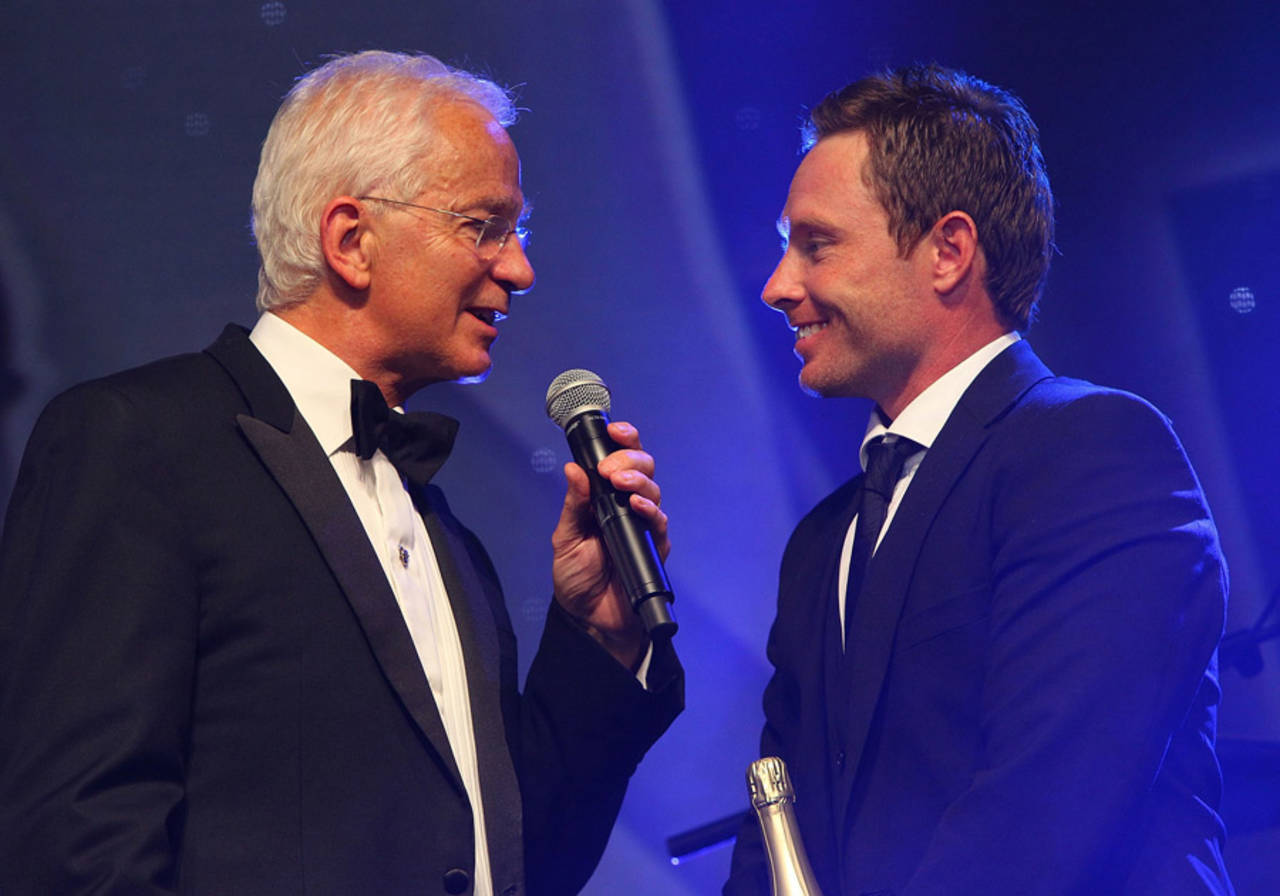When heroes fall
Why do once-great players insist on tarnishing our image of them by going into the commentary box?
Samir Chopra
31-Jul-2013

David Gower: better remembered with bat in hand than mike • Tom Dulat/Getty Images
In the summer of 1979, I fell in love with David Gower. It must have been love; what else would explain the trembling anticipation of a glimpse of his seemingly perpetually sunny countenance, his lissome strokeplay, and his electric fielding? What else could ground the sick fear I felt that he would be dismissed all too prematurely, that a crude umpiring mistake would brutally smear the canvas of his artistry? Did it matter that he was "the enemy"? I was ready to betray all - friends, family and country - for this man.
Nowadays I still see Gower on occasion. He has aged, rather gracefully. I've finally become familiar with his cultured, private-school intonations. (Back in the summer of 1979, I could only impute dulcet tones to his imagined voice.) He commentates, analyses and ruminates; on television. He asks questions, follows-up (not on), and offers expert opinion. Gower is now a member of the media, of that contingent of ex-cricketers who make a living by talking about cricket.
I don't think I love him anymore. I don't dislike him either, but there is no mystique about him. Gower has become mundane, ordinary, run-of-the-mill, just another groomed, suited, well-rehearsed frontman. He does his job competently, and that's about it. From hero to humdrum in the course of a few easy steps.
My assessment of my relationship with Gower is relatively mild compared to that with some other cricketers who have made the transition from crease occupation to commentary box stakeout. Gower gets off lightly. Others who I once revered are now reviled: they bore me with their meandering descriptions, their partisanship, their fallacy-riddled arguments, their jumping on ideological bandwagons, their incoherence.
I've written of a related fall from grace of my heroes before; but in that case I was describing my changing relationship to cricketers in general, one occasioned by my changing station in life. This relationship is attenuated by that growth, of course, but with a difference: here, a childhood hero has stuck around too long in the limelight, has declined the opportunity to seek a quiet life after retirement, which, even if not Pynchonesque or Salingeresque in its seclusion, at least ensures the careful guarding of the aura so carefully constructed by his feats on the fabled 22 yards.
Here a hero becomes tragically complicit in the deconstruction of his own image. That image, the subject of childhood adoration and adulation, was built up from radio commentary, television broadcasts, and sometimes, most dramatically, by the action photograph. Our hero's efforts were rendered ever more dramatic by the contributions of these media; they became larger than life. That same image, that cluster of mental associations, was slowly replaced by others: the querulous, garrulous, self-centred opinionator, all too happy to waffle on, trafficking in irrelevances and clichés.
I wonder why, besides the allure of the big paycheck, our heroes do this to us. Are they afraid of the constant idolisation? Do they imagine that television will turn them into bigger stars than they were, that the glory of media is greater than that of the feats that brought them to its attention? They seem blithely unaware of the perils of over-exposure, of the relentless, merciless gaze of the camera, the omnipresence of the microphone, the possibilities for endless replay of their worst moments.
Modern television coverage of cricket disdains the professional journalist and seeks instead, exclusively, the famous ex-cricketer with which to staff its commentariat. The most pernicious effect of this personnel strategy has been to ensure, for a legion of fans, an ongoing demotion of the status of their idols. They stand exposed now, no longer assessed for their cricketing skills but for something else altogether, a task for which their experience on the field has not necessarily prepared them.
If only they could bring themselves to see what we do; perhaps some of them would walk away from it all. One can only hope.
Samir Chopra lives in Brooklyn and teaches Philosophy at the City University of New York. He tweets here